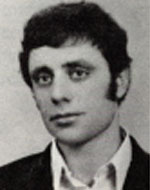Shaul, Amir
Amir, son of Miriam and Salim, was born on December 3, 1950 in Karakuk, Iraq. That same year he immigrated to Israel with his family, and he was four months old. He studied at the elementary school in the village of Bnei Ayish, near Gedera, and completed his studies at the Mikve Israel agricultural high school near Holon. Amir was diligent and ambitious. From an early age he set goals for himself, which he pursued with persistence. He was quiet, smiling and shy. His approach to life was serious and mature. Despite his shyness, he quickly adjusted to new people and places. His green eyes captured every man’s heart and his easy nature earned him many friends everywhere. Amir was also a son who caused his parents a lot of pleasure. He cared for the family more than he took care of himself. Every vacation and every opportunity was saved to work, to finance his own expenses and to remove this burden from the family of many souls. Even pocket money refused to be received from his father and if appropriate, after much entreaty, he always took a small sum. Amir was drafted into the Israel Defense Forces in early August 1969 and assigned to the Armored Corps, where he was sent to serve in a field unit, in the post of “Loader.” He was a model soldier and was admired by the commanders and soldiers of the unit. He had never encountered discipline problems and had never heard a complaint from him about difficulties in the life of the army, in the seriousness he had devoted himself to his work and fulfilling his daily obligations with obedience and will. During his service in the army he made sure not to cause unnecessary worries to his parents, and often wrote home and called every opportunity. At the end of his regular service, he was accepted for another year of study at Mikve Israel, in order to study agricultural technology in the citrus track. After completing this year with full success, he was certified as a technician and immediately found a job for him at the Brocer company. In the Yom Kippur War, Amir first participated in the fighting in the north and was later transferred to the battle zone in the south. He went into a battle, and on 13 Tishrei, October 9, 1973, his tank was hit directly during the battle near the Gidi crossing. From the testimonies of his comrades-in-arms, it became clear that the surviving crew members had not been able to rescue him from the damaged tank, and since they were in the area exposed to enemy fire, they had to withdraw and leave him in the tank. The tank was then seen towed by the Egyptians. Amir was declared missing and for more than half a year his family lived in the hope that he had survived and was captured by the Egyptians. After his name was not included in the list of prisoners who came from Egypt, he was declared as “disappeared”. After his body was found and identified, Amir was brought to eternal rest in the Kiryat Shaul military cemetery. Survived by his parents, three brothers and three sisters.
